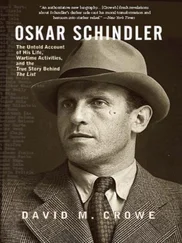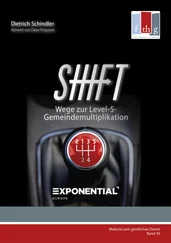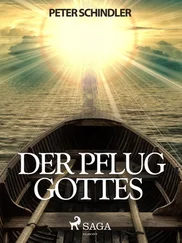Did Herr Schindler know something would happen in Józefa Street and Izaaka Street? Or was he just brandishing the names? In any case, Stern suffered a nauseating sense of disappointment. Herr Schindler was whistling up a pogrom, boasting inexactly about it, as if to put Stern in his place.
It was December 3. When Oskar said “tomorrow,” Stern presumed he was using the term not in the sense of December 4, but in the terms in which drunks and prophets always used it, as something that either would or damn well should happen soon. Only a few of those who heard, or heard about, Herr Schindler’s boozy warning took it literally. Some packed an overnight bag and moved their families across the river to Podgórze.
As for Oskar, he felt he had passed on hard news at some risk. He had got it from at least two sources, new friends of his. One, an officer attached to the SS police chief’s staff, was a policeman named Wachtmeister (sergeant) Herman Toffel. The other, Dieter Reeder, belonged to the staff of SD chief Czurda. Both these contacts were characteristic of the sympathetic officers Oskar always managed to sniff out.
He was never good, though, at explaining his motives for speaking to Stern that December. He would say later that in the period of the German Occupation of Bohemia and Moravia he had seen enough seizure of Jewish and Czech property, and forcible removal of Jews and Czechs from those Sudeten areas considered German, to cure him of any zeal for the New Order. His leaking of the news to Stern, far more than the unconfirmed Nussbaum story, goes some way toward proving his case.
He must have hoped also, as the Jews of Cracow did, that after its initial fury the regime would relax and let people breathe. If the SS raids and incursions of the next few months could be mitigated by the leaking of advance information, then perhaps sanity would reassert itself in the spring. After all, both Oskar and the Jews told themselves, the Germans were a civilized nation.
The SS invasion of Kazimierz would, however, arouse in Oskar a fundamental disgust—not one that impinged too directly yet on the level at which he made his money, entertained women or dined with friends, but one that would, the clearer the intentions of the reigning power became, lead, obsess, imperil, and exalt him. The operation was meant in part to be a raid for jewelry and furs. There’d be some evictions from houses and apartments in the wealthier borderland between Cracow and Kazimierz. But beyond these practical results, that first Aktion was also meant to serve dramatic notice to the dismayed people of the old Jewish quarter. For that purpose, Reeder told Oskar, a small detachment of Einsatzgruppe men would drive down Stradom and into Kazimierz in the same trucks as the boys of the local SS and the Field Police.
Six Einsatzgruppen had come to Poland with the invading army. Their name had subtle meanings.
“Special-duty groups” is a close translation. But the amorphous word Einsatz was also rich with a nuance—of challenge, of picking up a gauntlet, of knightliness. These squads were recruited from Heydrich’s Sicherheitsdienst (SD; Security Service). They already knew their mandate was broad. Their supreme leader had six weeks ago told General Wilhelm Keitel that “in the Government General of Poland there will have to be a tough struggle for national existence which will permit of no legal restraints.” In the high rhetoric of their leaders, the Einsatz soldiers knew, a struggle for national existence meant race warfare, just as Einsatz itself, Special Chivalrous Duty, meant the hot barrel of a gun.
The Einsatz squad destined for action in Kazimierz that evening were an elite. They would leave to the pieceworkers of the Cracow SS the sordid task of searching the tenements for diamond rings and fur-trimmed coats. They themselves would take part in some more radically symbolic activity to do with the very instruments of Jewish culture—that is, with the ancient synagogues of Cracow.
They had for some weeks been waiting to exercise Einsatz, as had the local SS Sonderkommandos (or Special Squads), also assigned to this first Cracow Aktion, and the Security Police of SD chief Czurda. The Army had negotiated with Heydrich and the higher police chiefs a stay of operations until Poland passed from military to civil rule. This passage of authority had now taken place, and throughout the country the Knights of Einsatz and the Sonderkommandos were unleashed to advance with an appropriate sense of racial history and professional detachment into the old Judaic ghettos.
At the end of the street where Oskar’s apartment stood rose the fortified rock outcrop of Wawel Castle from which Hans Frank ruled. And if Oskar’s Polish future is to be understood, there is a need to look at the linkage between Frank and the young field operatives of SS and SD, and then between Frank and the Jews of Cracow.
In the first place, Hans Frank had no direct kingship over these special squads moving into Kazimierz. Heinrich Himmler’s police forces, wherever they worked, would always be their own lawmakers. As well as resenting their independent power, Frank also disagreed with them on practical grounds. He had as refined an abomination of the Jewish population as anyone in the Party and found the sweet city of Cracow intolerable because of its manifold Jews. In past weeks he’d complained when the authorities tried to use the Government General, and especially Cracow with its railway junction, as a dumping ground for Jews from the cities of the Wartheland, from Łódź and Poznan. But he did not believe the Einsatzgruppen or the Sonderkommandos, using current methods, could really make a dent in the problem. It was Frank’s belief, shared with Himmler in some stages of “Heini’s” mental vagaries, that there should be a single vast concentration camp for Jews, that it should at least be the city of Lublin and the surrounding countryside, or even more desirably, the island of Madagascar.
The Poles themselves had always believed in Madagascar. In 1937 the Polish Government had sent a commission to study that high-spined island so far from the coasts of their European sensibilities. The French Colonial Office, to which Madagascar belonged, was willing to make a deal, government to government, on such a resettlement, for a Madagascar crowded with Europe’s Jews would make a grand export market. The South African Defense Minister, Oswald Pirow, had acted for a time as negotiator between Hitler and France in the matter of the island. Therefore Madagascar, as a solution, had an honorable pedigree. Hans Frank had his money on it and not on the Einsatzgruppen.
For their sporadic raids and massacres could not cut down the subhuman population of Eastern Europe. During the time of the campaign around Warsaw, the Einsatzgruppen had hung Jews up in the synagogues of Silesia, ruptured their systems with water torture, raided their homes on Sabbath evenings or feast days, cut off their prayer locks, set their prayer shawls afire, stood them against a wall. It had barely counted. There were many indications from history, Frank proposed, that threatened races generally outbred the genocides. The phallus was faster than the gun.
What no one knew—neither the parties to the debate, the well-educated Einsatzgruppe boys in the back of one truck, the not-so-refined SS boys in the back of another, the evening worshipers in the synagogues, Herr Oskar Schindler on his way home to Straszewskiego to dress for dinner—what none of them knew and many a Party planner scarce hoped for was that a technological answer would be found—that a disinfectant chemical compound, Zyklon B, would supplant Madagascar as the solution. There had been an incident involving Hitler’s pet actress and director, Leni Riefenstahl. She had come to Łódź with a roving camera crew soon after the city fell and had seen a line of Jews—visible Jews, the prayer-locked variety—executed with automatic weapons. She had gone straight to the Führer, who was staying at Southern Army headquarters, and made a scene. That was it—the logistics, the weight of numbers, the considerations of public relations; they made the Einsatz boys look silly. But Madagascar too would look ridiculous once means were discovered to make substantial inroads into the subhuman population of Central Europe at fixed sites with adequate disposal facilities which no fashionable moviemaker was likely to stumble upon.
Читать дальше












